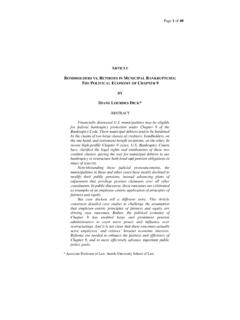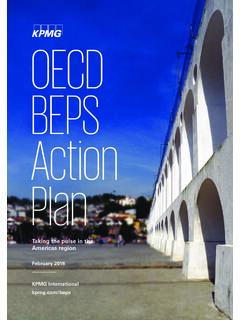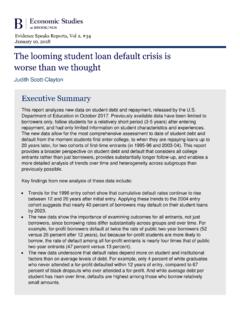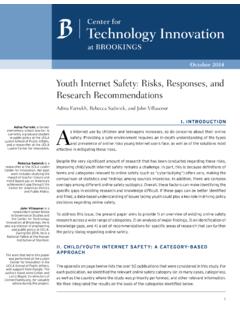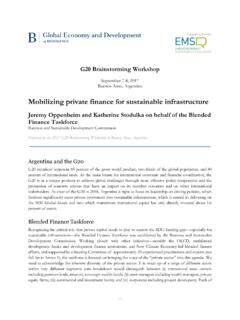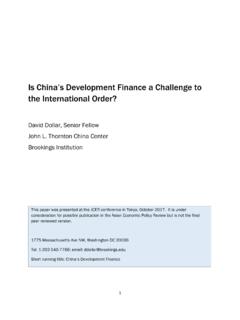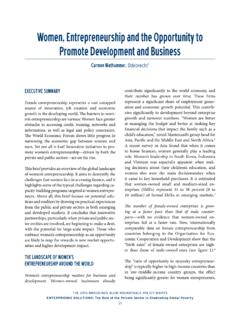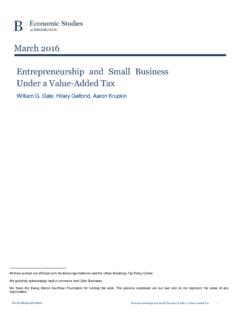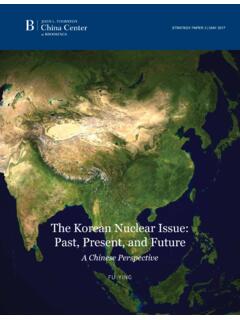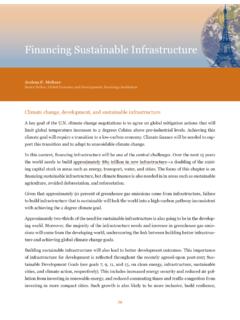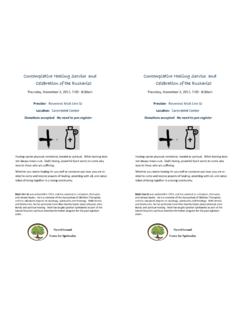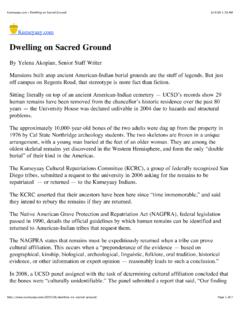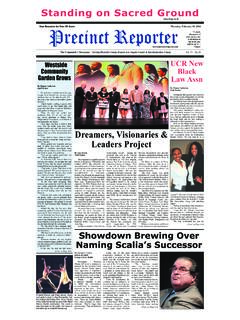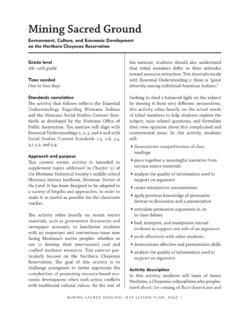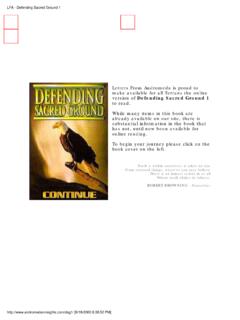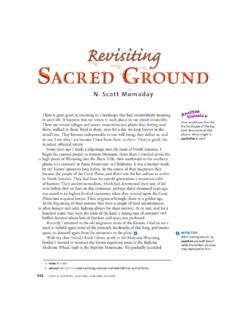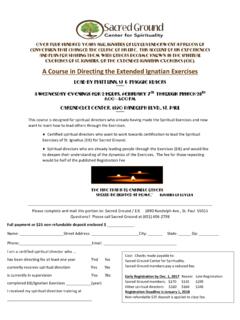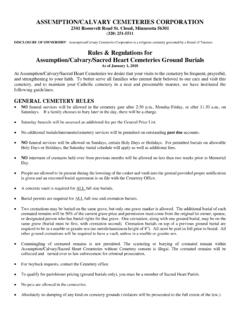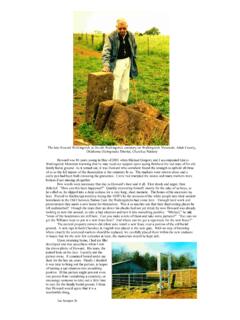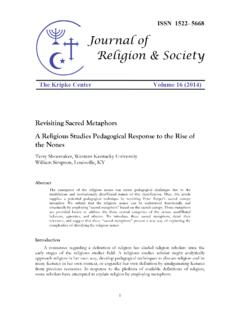Transcription of American Muslims and the Rediscovery of America’s Sacred ...
1 127 American Muslims and theRediscovery of America sSacred GroundINTRODUCTIONThe American muslim community is at a crucial crossroads. It is experienc-ing an existential crisis. Students of Islam in the West are beginning to askquestions about the future of Islam, and Muslims in an increasingly Islamo-phobic West are growing wary of the unrest and growing tide of extremismin the muslim the same time, American Muslims have reached acritical mass. This gives them a presence that promises influence in the main-stream society, and a visibility that also attracts a backlash, as people fear itsgrowth and influence.
2 Some scholars, such as Fawaz Gerges, maintain thatthe contemporary Arab and muslim experience is similar to that of commu-nities such as American Jews and Irish Americans, who too were assimilatedonly after being discriminated against, marginalized, and is that the catastrophic events of September 11, 2001, and theopen-ended war on terror has exaggerated and traumatized further thepotential for Muslims to become fully participating members in the greaterAmerican A. Muqtedar KhanChapter 9/15/05 9:56 AM Page 127 The determination of the American muslim community to make animpact on the political, theological, and cultural scene on North America,and the growing fear and prejudice against Islam and Muslims in the UnitedStates, has created a unique situation for Muslims .
3 Unlike Protestants,Catholics, Jews, Mormons, and others, American Muslims do not yet have aplace in American society. To understand the relative standing of various religious communities inthe United States, consider this: since 2004, the State Department has beenmandated by Congress to produce an annual report on global purpose is to protect Jews worldwide from prejudice, hatred, and United States now also funds many Christian projects through itsfaith-based-initiative the same government also supports thePATRIOT Act and other initiatives that systematically target Muslims and vio-late their civil rights on the basis of their religion.
4 This less-than-equal statusof the American muslim community has resulted in American Muslims beingthe victims of illegitimate laws passed in the Civic Public only has to visit the Web sites of several evangelical Christianchurches and communities to witness the horrific levels of Islamophobia thatexist today. The case of General Boykin, while in charge of intelligence at theDepartment of Defense, is such an example. He visited Churches andindulged in anti-Islam and anti- muslim rhetoric. Numerous Islamophobiccomments made by prominent Christian leaders such as Rev.
5 Franklin Gra-ham, Rev. Jerry Falwell, Rev. Jerry Vine, and Rev. Pat Robertson also clearlysuggest that there is an atmosphere in the United States that encourages anti- muslim prejudice to thrive in the Conscientious Public saidthat, it is also important to recognize that many Christian groups have comeforward in solidarity with Muslims to protect their civil rights, that graduallyan interfaith space has emerged sympathetic to muslim conditions, and thatmany are working together to redress the situation. American muslim s internal struggles and outreach have generated amoral dialogue in the Conscientious Public Forum, which is developing astrong civil society movement to raise public awareness to impact the CivicPublic Forum institutions that victimize Muslims .
6 Because of these develop-ments, American Muslims are uniquely poised to help all Americans redis-cover America s Sacred ground . ASPIRATIONS OF THE American muslim COMMUNITYM uslim immigrants who started coming to the United States in the early1960s had already tasted the elixir of Islamic revivalist fervor and experi-enced the brutality and autocracy of their governments of origin, which wereinterested in either crushing or co-opting emerging Islamic movements. Sev-eral members of the various Islamic movements such as the muslim brother-128 American Muslims and the Rediscovery of America s Sacred 9/15/05 9:56 AM Page 128hood and the Jamaat-e-Islami came to America, and many of them soon dis-covered the epochal opportunity that America a society where there is political and religious freedom, Muslims couldquickly organize and freely establish Islamic movements that were constantlyrepressed in the heartlands of the muslim world.
7 While there was deep hos-tility and prejudice towards Islam and Muslims , it was nothing compared tothe stifling character of despotic regimes in Egypt, Iraq, Iran, Saudi Arabia,Libya, Sudan, and Palestine (under Israeli colonialism). The easiest and often the only way for these Muslims to come to Americawas through the route of higher education. They came; they earned in natural and social sciences, and they stayed to create a crucial massof intellectual muslim elite in the United States. The nature of this immigra-tion became a filtering process, allowing only better-educated and intellectu-ally sophisticated individuals to enter from the Arab world.
8 Add to this theflow of muslim professionals and scholars escaping poverty and pooreconomies from India, Pakistan, and Bangladesh, and the result was a Mus-lim leadership capable of articulating enlightened self-interest and formulat-ing a far-reaching vision for the revival of Islam and Islamic the freedom to rethink the Islamic civilization project and toindulge in serious rejuvenation of the stagnant Islamic sciences was not avail-able in the muslim world, American Muslims found that their new home inthe United States opened new possibilities. Islamists who found themselvesin leadership positions in the emerging American muslim community essen-tially had one overriding goal: to revive Islamic civilization throughout theworld, including in the United strongly believed that the key toreviving Islamic civilization was the intellectual revival of the Ummah(Islamic community or nation), which is in effect a top-down, overarchingworldview approach to government.
9 Intellectuals such as Ismail Farooqi andhis Islamization of Knowledge Project, and Seyyed Hossein Nasr and hisIslamic Philosophy and Islamic Sciences Project are indicative of this think-ing. The founding of the Association of muslim Social Scientists9was the firststep towards establishing this revivalist thinking within some kind of institu-tional setting. The freedom available in the West led to further institutional developmentof this revivalist agenda and led to the establishment of the InternationalInstitute of Islamic Thought (IIIT) in Virginia and the Islamic Foundation inLeicester, United Kingdom.
10 These are think tanks dedicated to the intellec-tual revival of Muslims . The idea was simple. Freedom of religion andthought in the West, and in America in particular, would produce Islamicideas and ideology and then be exported back to the muslim world wherethey would be introduced and tested in the hope that they would stimulateand galvanize social and religious reform. Both centers have produced pro-lific literature in the forms of books and journals on various aspects ofM. A. Muqtedar 9/15/05 9:56 AM Page 129 Islamic sciences and social sciences.
